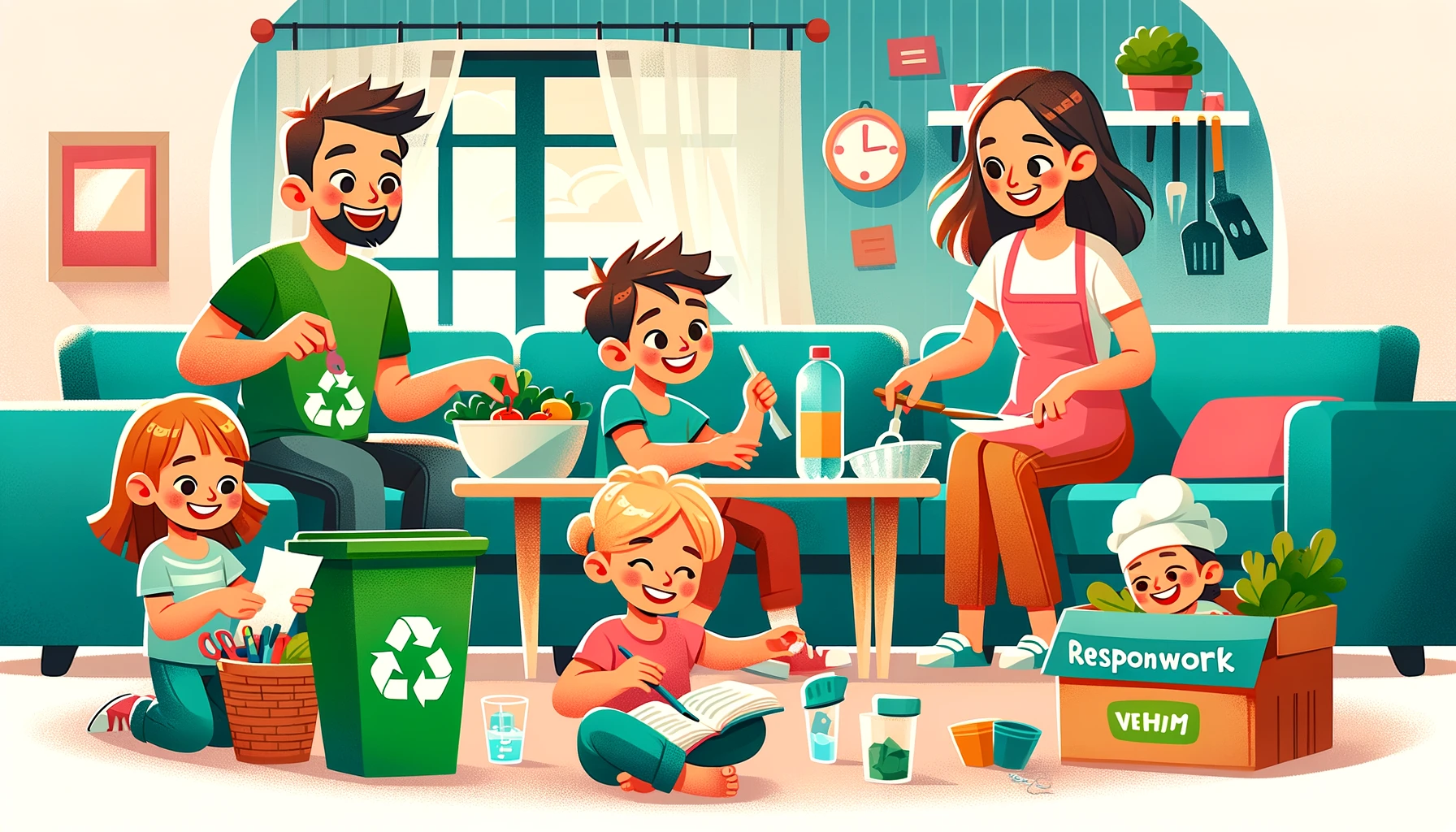The joys of parenting! From the first adorable giggle to the hundredth “Why?”, raising a child is a rollercoaster of emotions, mostly panic and confusion, with a sprinkle of pride. But let’s talk about responsibility. It’s time to turn your little bundle of joy into a responsible human being, or at least someone who doesn’t leave their socks in the living room.
Understanding Responsibility
Before we dive into the ‘how-to’ of molding responsible little humans, let’s pause and ponder what responsibility really means. It’s not just about doing chores or finishing homework; it’s about developing a sense of duty, understanding consequences, and learning to be a reliable member of society (or at least the household).
What Does Responsibility Mean?
Responsibility, in the parenting universe, is teaching your child to take care of themselves, others, and their environment. It’s about making choices and understanding the outcomes of those choices. Think of it as the training wheels for life; eventually, they come off, and you hope you’ve done enough to stop them from crashing.
Normal Responsibility Through Different Stages of Childhood
Now, let’s talk about what’s normal through different stages of childhood. It’s important to have realistic expectations because expecting your toddler to balance the checkbook might be a bit too much.
- Toddlers (Ages 1-3): This is the ‘Me do it!’ phase. They’re learning basic tasks like putting toys away, feeding themselves, and maybe helping with simple chores. It’s less about the task and more about fostering independence.
- Preschoolers (Ages 3-5): At this stage, they can handle more complex tasks like setting the table (plasticware to start with, please), helping with pets, and choosing their outfits (expect some interesting fashion choices).
- School-Age Children (Ages 6-12): Now we’re entering the big leagues. They can take on more responsibilities like homework, more complex chores, and managing their time. This is also the age to start discussing money, saving, and maybe even a small allowance.
- Teenagers (Ages 13+): Strap in; it’s going to be a bumpy ride. Here, responsibility includes managing schoolwork, possibly a part-time job, and their social life. It’s about preparing them for adulthood, giving them more freedom, and hoping they don’t use it to dye their hair green (unless that’s their thing).
Remember, every child is different, and what works for one may not work for another. It’s a mix of patience, trial and error, and a lot of deep breaths. Now, let’s get to that teaching thing.
How to Teach Responsibility?
1. Lead by Example, or How to Pretend You’ve Got It All Together
Let’s face it, teaching responsibility starts with you, the adult. Yes, you, with the laundry pile that’s been sitting for a week. Children are like sponges, soaking up all your habits, good and bad. Start by showing them that you can complete tasks without whining more than they do. Demonstrate simple, everyday responsibilities like paying bills on time, doing chores, and not eating ice cream for breakfast (at least when they’re watching).
2. Chore Wars: Turning Housework into a Game
No child in the history of childhood has ever said, “Yay, chores!” But here’s the trick: turn it into a game. Create a chore chart with fun stickers. Every time they complete a task, they get a sticker. Collect ten stickers, and they win a prize – like an extra bedtime story or, dare I say, a later bedtime on weekends. This not only teaches responsibility but also basic math skills, and let’s be honest, a bit of bribery.
3. Money Talks: The Art of Earning and Saving
Give them a small allowance for completing certain tasks. This doesn’t mean you turn your home into a sweatshop. Keep it simple. Something like, ‘put away your toys and earn a dime’. This way, they learn the value of money and how to save for things they want. Plus, it gives them a taste of real life where, sadly, money doesn’t grow on trees or magically appear in your wallet.
4. Time Management: The Race Against the Clock
Teach them about time management. Start with simple tasks like getting ready for school on time or finishing homework before play. Use timers or fun clocks. Make it a race – can they beat the clock? This not only teaches them the importance of time but also saves you from the last-minute morning meltdowns.
5. The Art of Natural Consequences
Welcome to the world of natural consequences, where actions have reactions, and no, I’m not talking about physics. If your child forgets their lunch, resist the urge to rush it to school. Hunger is a great teacher (don’t worry, the school won’t let them starve). Forgot to pack their sports gear? Looks like they’re sitting on the sidelines. These moments teach them the importance of preparation and responsibility for their actions, or lack thereof.
6. Consistency is Key (and Also Really Hard)
Consistency: easier said than done, right? Set clear rules and stick to them. If bedtime is at 8 PM, then the nightly negotiations should end at 8 PM, not 8:15 PM because they gave you puppy eyes. Consistency teaches them that rules are not suggestions and that you mean business, even when they bring out the big guns (those tears that melt your heart).
7. The Importance of Follow-Through
If you set a consequence, follow through. No empty threats here. If you say, “No TV if you don’t finish your homework,” and they don’t finish it, then no TV it is. It’s tough love, but it teaches them that you’re serious and that actions, or inactions, have consequences. Plus, it saves you from becoming the parent who cries wolf.
8. Celebrate the Wins
Remember to celebrate their wins, no matter how small. Finished a book? Awesome! Helped with dinner? High five! Recognizing their efforts reinforces positive behavior and boosts their self-esteem. It’s not all about pointing out what they did wrong; it’s also about celebrating what they did right.
Conclusion
It’s not about being the perfect parent; it’s about being the parent who’s trying their best. And sometimes, that means being the bad cop in the short term to raise a responsible adult in the long term.
Pro Tips: The Cherry on Top of Your Parenting Sundae
- Embrace the Power of Routines: Establishing routines can be a game-changer. Regular schedules for meals, homework, and bedtime create a sense of order and predictability. Kids thrive when they know what to expect, and routines naturally teach them to manage their time and responsibilities.
- Encourage Problem-Solving: Instead of swooping in to fix every problem, encourage your child to think of solutions. Ask questions like, “What do you think you could do to solve this?” It fosters independence and critical thinking – skills vital for responsible adults.
- The Art of Apologizing: Teach them that making mistakes is human, but owning up to them is a mark of responsibility. Show them how to apologize genuinely when they’re wrong. It’s not just about saying “sorry”; it’s about understanding the impact of their actions.
- Reward Effort, Not Just Success: In the race to teach responsibility, don’t forget to acknowledge effort. Celebrate the process, not just the outcome. This teaches them that trying and failing is part of learning and growing.
- Open Communication Channels: Create an environment where your child feels comfortable discussing their successes and failures. Open communication fosters trust and lets them know it’s okay to seek help when they’re struggling with their responsibilities.
- Lead by Empathy: Show empathy and understanding. When children see their parents being considerate and empathetic, they learn to mirror these emotions in their dealings with others, which is a significant aspect of being responsible.
- Don’t Forget to Have Fun: Last but not least, remember that childhood is also about having fun. Balance responsibility with play. It’s important for children to have time to just be kids.
FAQs: Teaching Responsibility to Kids
You can start as early as toddlerhood with simple tasks like picking up toys. The key is age-appropriate responsibilities. As they grow, gradually increase the complexity of the tasks to match their developmental stage.
Start with a small allowance linked to chores. Teach them to save for something they want, showing that money is earned and has value. Open a savings account or use a piggy bank to make it visual and exciting.
Use tools like chore charts or reminder lists. Be patient and consistent with reminders. Also, understand that forgetting is part of the learning process. Use these moments as teaching opportunities rather than just expressing frustration.
Turn chores into a game, use reward systems like stickers or points, and celebrate achievements. Involvement in planning can also make tasks more engaging. Be creative and see what resonates with your child.
Yes, consequences are a vital part of teaching responsibility. Ensure they are appropriate and related to the task. For example, if they don’t clean up their toys, the toys could be put away for a day. Always explain why there’s a consequence.
Understand the reason behind the resistance. Offer choices within tasks, so they feel some control. Stay calm and avoid power struggles. Sometimes, it’s also okay to let them face the natural consequences of not doing a task.
Absolutely. It’s important to find a balance. Too many chores can lead to burnout and resentment. Ensure there’s enough time for play, relaxation, and just being a kid.
It’s crucial. Children learn a lot by observing. If they see you fulfilling your responsibilities, managing time well, and handling mistakes gracefully, they are more likely to emulate these behaviors.



